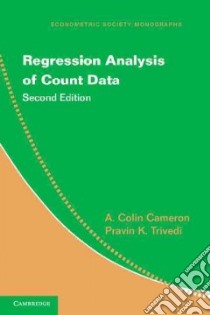- Libreria
- >
- Libri in lingua
- >
- Economia, finanza e management
- >
- Econometria
Regression Analysis of Count Data - 9781107014169
Un libro in lingua di A Colin Cameron edito da CAMBRIDGE UNIVERSITY PRESS, 2013
- € 128.70
- Il prezzo è variabile in funzione del cambio della valuta d’origine
"Introduction God made the integers, all the rest is the work of man. - Kronecker. This book is concerned with models of event counts. An event count refers to the number of times an event occurs, for example the number of airline accidents or earthquakes. An event count is the realization of a nonnegative integer-valued random variable. A univariate statistical model of event counts usually specifies a probability distribution of the number of occurrences of the event known up to some parameters. Estimation and inference in such models is concerned with the unknown parameters, given the probability distribution and the count data. Such a specification involves no other variables and the number of events is assumed to be independently identically distributed (iid). Much early theoretical and applied work on event counts was carried out in the univariate framework. The main focus of this book, however, is regression analysis of event counts. The statistical analysis of counts within the framework of discrete parametric distributions for univariate iid random variables has a long and rich history (Johnson, Kemp, and Kotz, 2005). The Poisson distribution was derived as a limiting case of the binomial by Poisson (1837). Early applications include the classicstudy of Bortkiewicz (1898) of the annual number of deaths from being kicked by mules in the Prussian army. A standard generalization of the Poisson is the negative binomial distribution. It was derived by Greenwood and Yule (1920), as a consequence of apparent contagion due to unobserved heterogeneity, and by Eggenberger and Polya (1923) as a result of true contagion"--
Informazioni bibliografiche
- Titolo del Libro in lingua: Regression Analysis of Count Data
- Lingua: English
- Autore: A Colin Cameron
- Editore: CAMBRIDGE UNIVERSITY PRESS
- Data di Pubblicazione: 30 Aprile '13
- Genere: MATHEMATICS
- EAN-13: 9781107014169


